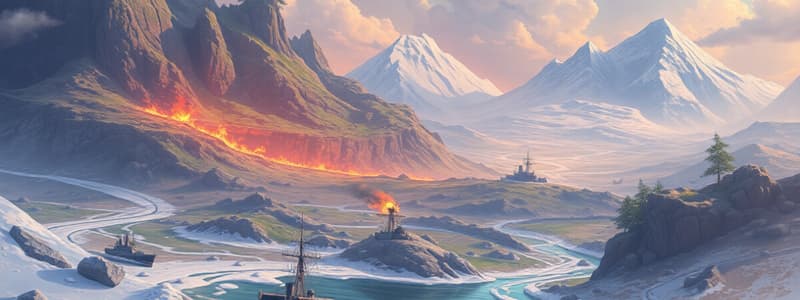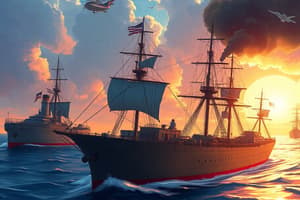Podcast
Questions and Answers
Welke factor speelt een cruciale rol in de geopolitieke strategieën van landen?
Welke factor speelt een cruciale rol in de geopolitieke strategieën van landen?
- Natuurlijke grondstoffen (correct)
- Klimaatverandering
- Technologische ontwikkelingen
- Culturele tradities
Hoe beïnvloedt de locatie van een land zijn geopolitieke omstandigheden?
Hoe beïnvloedt de locatie van een land zijn geopolitieke omstandigheden?
- Door de toegang tot internationale handelsroutes (correct)
- Door de culturele diversiteit binnen het land
- Door de invloed op de landbouwproductiviteit
- Door de bouw van moderne infrastructuur
Wat is een voorbeeld van een omgevingsvariabele die de geopolitiek beïnvloedt?
Wat is een voorbeeld van een omgevingsvariabele die de geopolitiek beïnvloedt?
- Bevolkingsdichtheid
- Technologische vooruitgang
- Fysieke grenzen (correct)
- Sociale media
Welk aspect van de fysische omgeving heeft een directe impact op geopolitieke relaties?
Welk aspect van de fysische omgeving heeft een directe impact op geopolitieke relaties?
Waarom zijn natuurlijke grondstoffen belangrijk in de geopolitiek?
Waarom zijn natuurlijke grondstoffen belangrijk in de geopolitiek?
Flashcards
Klassieke geopolitieke factoren
Klassieke geopolitieke factoren
Factoren zoals geografische ligging, natuurlijke hulpbronnen, grenzen en andere eigenschappen van de fysieke omgeving die invloed hebben op de macht en het gedrag van staten.
Locatie
Locatie
De positie of plaats van een land ten opzichte van andere landen en geografische kenmerken.
Natuurlijke grondstoffen
Natuurlijke grondstoffen
Natuurlijk aanwezige resources zoals olie, mineralen, landbouwgrond, hout, water, etc. die een land kan benutten voor economische ontwikkeling en militaire macht.
Grenzen
Grenzen
Signup and view all the flashcards
Fysieke omgeving
Fysieke omgeving
Signup and view all the flashcards
Study Notes
Classical Geopolitical Factors / Environmental Variables
- Location: Geographic location plays a crucial role in geopolitical strategy. Proximity to resources, strategic waterways, or important trade routes significantly impacts a nation's power and influence. Access to ports and sea lanes are prime examples of how location dictates national capabilities.
- Natural Resources: Availability and distribution of natural resources like oil, minerals, and water are key geopolitical factors. Countries rich in such resources often enjoy economic and strategic advantages, but can also face challenges like resource nationalism and geopolitical tensions over access.
- Natural Terrain and Geography: Mountains, deserts, or forests can act as natural barriers or avenues for invasion, affecting military strategies and influencing the direction of conflicts. Topography and climate can dictate population density and the feasibility of infrastructure development as well. These factors directly impact a nation's ability to defend its territory and project its power.
- Boundaries and Borders: Precisely defined and undisputed boundaries are paramount for stability. Disputed borders can lead to conflicts and instability, often with severe human cost. The historical evolution of border demarcations can have lasting consequences on international relations and geopolitical dynamics.
- Climate: Climate patterns and variability significantly affect agricultural production, population density, and the overall economic viability of a region. Extreme weather events or climate change can cause displacement, resource scarcity, and create geopolitical instability.
- Demographics: Population size, density, and distribution can influence a nation's political and economic power. Migration patterns and demographic shifts can further impact the geopolitical landscape, often causing internal tensions and conflicts concerning resources and infrastructure.
- Technology: Technological advancements in military hardware and capabilities have profound effects on geopolitical relations. Advances in communication and surveillance technologies reshape power balances and force nations to adapt their strategies.
- Infrastructure: The quality and extent of a country's transportation, communication, and energy infrastructure significantly affect its economic output, military capabilities, and overall strategic presence in the world.
- Economic Factors: Economic strength and resource availability influence a nation's ability to project power, and influence international affairs. Countries with strong economies are often equipped with the resources for investments such as military improvements and infrastructure advancements.
- Political Systems: Internal political dynamics and governance can impact a state's foreign policy stance and ability to engage with other nations. Political stability and institutional capacity are critical for effective international relations and geopolitical influence.
Studying That Suits You
Use AI to generate personalized quizzes and flashcards to suit your learning preferences.




